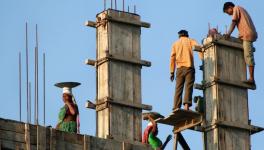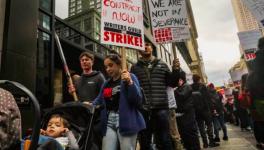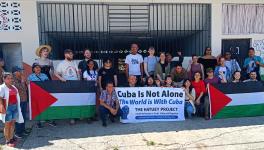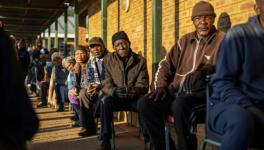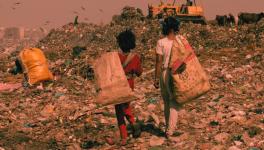NUMSA and the Middle Class
South Africa’s biggest union, the National Union of Metalworkers South Africa (NUMSA), has entered the second week of its strike. Its 2.2 lakh striking members are relentlessly fighting for their economical and political rights like double-digit wage increment (10%), housing allowance, ban on labour brokers, paid leave etc. The Union, which openly endorses socialism, is in no mood to end the strike at such a crucial stage.In an extensive interview, Numsa’s general secretary, Irvin Jim, talks about NUMSA’s current strike, alliance politics as well as its United Front and Movement for Socialism.
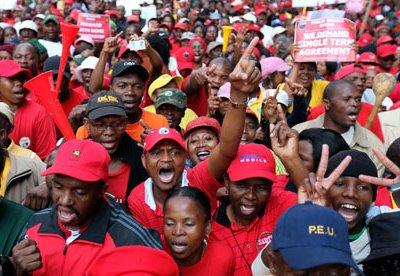
Courtesy: sacsis.org.za
Transcript:
FAZILA FAROUK: Welcome to the South African Civil Society Information Service. I’m Fazila Farouk in Johannesburg.The labour movement and political landscape is undergoing a tectonic shift at the moment. Now much of this can be deduced from the current struggles within the tripartite alliance and particularly in relate to the split inside trade union federation Cosatu, where some voices within the labour movement are calling for greater accountability from the ruling ANC. With 20 years of democracy not showing many gains for the working class in South Africa, some trade unions inside Cosatu are starting to question the value of this alliance partnership. And the most vocal amongst those calling for greater accountability from the ANC, is NUMSA, the National Union of Metalworkers of South Africa. Now Numsa is very much in the news at this week. Their workers are out on strike and they have a long list of serious demands, which include a wage increase of between 12-15%, a housing allowance of R1000. They're calling for a ban on labour brokers and they're also calling for the youth wage subsidy to be stopped. Now some commentators are calling this strike of Numsa, a political strike. They’re saying that Numsa is trying to send a strong message to government and to the private sector and that Numsa has a point to prove. And they're making this remark particularly in relation to the fact that AMCU (Association for Mineworkers and Construction Union) has successfully concluded its five month long strike and they've made significant gains for workers on the platinum sector. And commentators are saying that they've raised the bar very high for other trade unions, so Numsa does have a point to prove. My guest today who is going to talk to us about all of these issues is Irvin Jim. He is the general secretary of Numsa. Welcome to SACSIS Irvin.
IRVIN JIM: Good afternoon.
FAZILA FAROUK: I'd like to start the conversation talking about the current strike that's taking place and then I want to talk a little bit about Numsa's United Front as well as also this movement for socialism that you're trying to launch. Can you comment on this critique that's out there at the moment that this is a political strike. That you've got a point to prove and its just posturing on Numsa's behalf at the moment.
IRVIN JIM: Well, I think a couple of points to be made. I think the first one is that the demands that are on the table -- I don't mind anybody who wants to launch a particular perspective on the Numsa strike. But I think the issue of labour brokers, the issues about the youth wage subsidy, to the extent that they have been driven by the state against our will. For instance, we have been calling on government for years now that it must ban labour brokers. We rejected, with contempt, the…basically, a stance taken by government where they subsidise, through workers, capital, by introducing a tax incentive scheme where workers would basically be…money would be deducted from them by the employers and this money will not be paid over to SARS an those employers would, by virtue of doing, they would bring in young people and they would pay them R5,000-R6,000. And we know that (at) the point of production, what companies have been doing (has) been to champion Japanese management techniques, which is about continuous improvement. Where they restructure the workplace; where they basically take information from workers and ask them a simple question: "What can we do to help you to work easy and to work smart?" And they take all that information and basically watch also their movements and take that information and restructure the workplace. If you were 1,000 workers working in a company, they will restructure the workplace such that 500 workers will basically be displaced (at) the point of production. But what they will not do is to compromise volumes of production. They will do this also by re-enforcing it, by bringing new technology that further displaces workers. I think for the past 20 years, that's what we had to grapple with -- with globalisation being presented as a panacea; with restructuring taking place (at) the point of production. And therefore, that is why we argued that to bring young people (at) the point of production who will produce in the production line, deliver quality production, but they will be paid between R2,000-R6,000, this can only be the ammunition (for) the bosses to further exploit the working class. If…therefore, anybody who wants to call us challenging, that we are busy with a political agenda; I don't think we deserve to be explaining that to anybody. Because I think exploitation of workers is what we stand against, is what we fought for all these years.
FAZILA FAROUK: I want to talk a little bit about what's happening in Cosatu and particularly in relation to alliance politics. At Numsa's Special National Congress in December, you called for Cosatu to break from the alliance. At the same time Numsa was very supportive of general secretary, Zwelinzima Vavi - of Cosatu - when he was suspended from Cosatu. But between December and now, quite a few things have changed. Vavi is back. He's been reinstated into his position as general secretary. As general secretary he trying to manage the discord inside Cosatu and he's trying to maintain this kind of shaky ceasefire within the alliance that you have…
IRVIN JIM: I think...(cross talk)
FAZILA FAROUK: On the one hand you're calling for Cosatu to break away from it and he's one of your strongest allies and its…For those of us sitting on the outside looking in, it looks like you're calling for one thing and he's trying to achieve something else inside. Can you comment on that?
IRVIN JIM: Well, I'm not sure whether he will succeed to manage the contradiction in the federation. Contradictions sometimes are necessary to break new ground. There are those who want to maintain the status quo. There are those, like us who fundamentally, who fundamentally feel very strongly that we need a radical programme, a programme that must ensure that we nationalise (the) commanding heights of the economy. We don't just do it. They must be in the hands of the working class who produce. But also to ensure that we champion manufacturing and industrialisation, and that we must smash the colonial wage.
FAZILA FAROUK: But my question really was related to the fact that, you know, your strongest ally doesn't necessarily seem to be on the same page (as) you.
IRVIN JIM: Vavi - well, I think it’s a complex question in the sense that for any…I'm the general secretary of Numsa. One of the things that is my primary responsibility is to do everything to ensure that workers are united, because united we stand, divided we fall. I guess, I will…I won't know how to lead Cosatu because it's very complex. Its different, autonomous affiliates -- the federation is but just an umbrella. I guess when you occupy that position you have got a duty and a responsibility to do everything to fight and to struggle for unity because unity is what can only make workers to defend their gains. It can only be a vehicle to ensure that it improves (their) condition. But my honest view is that I think what is critical for Vavi is to continue to champion the cause of the working class and the poor. (It’s) not to try and satisfy various factions that are already made. In my view is that there are forces who will stop at nothing in fighting a progressive left agenda in the federation. I think those forces will do everything, including splitting the federation. Because I think, within the ANC (African National Congress), SACP (South African Communist Party), there is a very strong view that Cosatu with Vavi who is ready to take workers to the street, Cosatu with Numsa, which continues to fight for an independent federation that takes mandate from workers, which is worker controlled and takes struggles on their behalf - but also Cosatu and Numsa that call for (the) working class to organise itself as a class for itself - that's not the kind of Cosatu that the ANC wants. That's not the kind of SACP leadership that it wants. Because the SACP leadership, since it went into parliament, it has become the defenders of the state in the true sense of the word. Their role, even before they went to the state…it has been...to manage contradiction -- different to the kind of vanguard we have always known. The vanguard party would know its role and mission. First is to continue to imbue the working class with political confidence; is to be able to communicate one message with the working class that you are the locomotive force of history; you are the only class capable of carrying the revolution (to) logical conclusion because you are numerical in numbers, as the working class; you are the most exploited. But because as the South African Communist Party or any party of any country, we've got a duty to raise your levels of consciousness (about) the class that exploits you. You've got capacity to be consistent to pursue the revolution. That's not our experience of the current South African Communist Party. Its role and mission today is to break the political confidence of the working class. It is using language to characterise in order to weaken and to liquidate any political confidence, for instance, that exists in Numsa. Its mission is to isolate Numsa purely for having political confidence. Who taught us that? The South African Communist Party, not the (inaudible). They have taught us that the working class, the contradiction between labour and capital is a fundamental contradiction. That contradiction can only be resolved by a revolution. It is not a communist party whose role and mission in that struggle between the working class and capital is to manage contradiction for maintenance of the status quo. Because a communist party we know, a vanguard party of the working class must be believing...that we need to smash capitalism. We need the working class…the future is socialism, which is not an end in itself, we need a classless society. But I mean, we don't have that vanguard party. Today as South African working class, as trade unions, we are vanguarding ourselves.
FAZILA FAROUK: Alright let's take a step away from alliance politics and let's talk about what Numsa is doing on your own to try and address the very many challenges that are facing the working class and South Africa's poor in general. At your December Special National Congress, you talked about the launch of a United Front, which would be an organisation sort of in the image of the United Democratic Front of the anti-apartheid era and then you also talked about the establishment of a Movement for Socialism. So those are two separate things. The United Front and the movement for socialism. Can you clarify for us the difference between the two, and what's your vision for the United Front in particular?
IRVIN JIM: Well, I think that the first thing that needs to be made (clear) is that the working class, the state of the working class in South Africa is very pathetic. The working class is vulnerable; the working class is exploited; the working class is leaderless; the working class is leading itself. I mean we have seen service delivery protests to (an organisation) who claims to be leading the working class within the liberation alliance. There is not a single one that basically takes up those particular battles and champions them. And the working class, I mean is, as I say, I mean, it's easy to throw statistics about 26 million people. But who (carries) the burden? It is the very same working class. The one person who's got a job, as I said, supports five to six extended families. And its tough for the working class. And they are being squeezed. You would see this sometimes when xenophobia erupts - the working class sometimes eats itself, where basically there would be a war on the basis of who are you and they vent anger to each other. We think that unless the advanced detachment of the working class -- and by saying so, we don't claim that Numsa (has) got a monopoly of that advanced detachment of the working class. We honestly think that across various sectors of the economy in this country there is an advanced detachment of the working class. And there was one old man in KZN (KwaZulu-Natal) by the name of Harry Gwala. He warned us long time ago that we must not make a mistake of thinking that when we are privileged by leadership, we lead the masses that have no political consciousness. The South African working class used four pillars of struggle: mass mobilisation, underground structures of our movement, Umkhonto weSizwe, (and) isolation of South Africa on trade. It was sons and daughters of the working class of this country who were (at) the cutting edges of bringing down the apartheid system in this country. And, we're very clear that in South Africa today there's just no better cause like a cause of building organisations of the working class and we think it is now the time for the working class to organise itself as a class for itself. For the past 20 years, we have done everything to try -- swell the ranks of the ANC. I mean we have sent comrades in droves to parliament and I think we have destroyed many, many comrades because once they are in the state, they get swallowed. They are in a movement whose liberation, whose character today…is basically…is found wanting. There is no difference between DA (Democratic Alliance) and ANC policy today. And we have taken a view in December that the time has come, first to do an honourable, thing in the interest - is to basically - there is that advanced detachment of the working class. The immediate task is to defend the momentary interests of the working class. And we said, we shall…Numsa will remain Numsa. It will remain a shield and a spear for workers. Numsa has got a duty and responsibility to defend its legal status, but it will not keep out of politics and therefore Numsa will be a catalyst for (the) realisation of a United Front. And by United Front, we literally say to all organisations of civil society…civil society organisations, NGOs, its time to come together and challenge the social ills that are as a result of the neoliberal agenda that has become so dominant in our country. We're very democratic in that we're playing a role of being a catalyst. We don't own monopoly of ideas. But we know very well that we defeated the apartheid regime in our townships. We chased them away using the "M Plan" of Madiba. So, I mean, the bottom line is that street and area committees, activists, are still there. Crime has escalated in this country. I mean violence has escalated in the country. Its not like we have got a shortage of campaigns to be taken both to defend our people against the neoliberal agenda, against particular measures that must make sure that the working class is taken care of, which is basically vulnerable as I have already said that basically, it has been (ground) by capitalism and unless it stands on its own to challenge the dominance of this neoliberal agenda, no other class will do it for the working class. And in our view we think that the starting point is fight for full implementation of the Freedom Charter..because…that's not an end, but just to realise full implementation, to champion manufacturing and industrialisation is very key for this country, if you are to deal with the sea of poverty, unemployment and inequality. Of course one of the resolutions that the special congress took said, "Look, are you going to wait till when? Are you going to wait for the communist party to wake up one day?" No, our own experience now both in the ANC and in the SACP - there's no longer democratically run organisations. Organisations get manipulated. The people who are in power determine the outcome of conferences. A typical example: We were in Mangaung, we won, for instance, a resolution on nationalisation of the commanding heights of the economy. But the leadership with (scribes) they wrote a (completely) different resolution in the ANC National Policy conference. In Mangaung, unilaterally took a decision outside the commissions, to clean the resolution and take out nationalisation. That is why we are very clear that the time has come for the working class...The working class needs its own workers' party and we call this a Movement for Socialism. But workers said don't rush. The nature and form…go and study what has happened in Latin America, look at what has happened in Brazil, what's happening in Cuba. Bring back those particular experiences. We already had three modules of political schools in Numsa, which are basically grappling with these questions, building political confidence, not just in Numsa, but bringing civil society organisations to begin to debate. We are going to have an international global symposium where we're bringing left formations into the country to have dialogue and what will follow later will be a study tour in Latin America where we are going to study those particular experiences. This year we would have launched the United Front and next year the central committee of Numsa will receive a report. It will take a decision on the nature and form of the Movement for Socialism, which will be launched.
FAZILA FAROUK: People are speculating though that this movement for socialism is indeed going to lead to a workers' party, which might contest the 2016 municipal election.
IRVIN JIM: Look, we have not shied away from that at all. We think that the time for us where we become generous and just allow every Tom, Dick and Harry, to claim to be representing our people with absolutely no consciousness is a problem. We have campaigned for particular critical municipalities in the past. We won, but what has happened? There's been no service delivery to our people. Their lives have not changed. We think that that that's a serious…the United Front would have to consider whether it must not contest (the) election. You know local government is very easy. You don't need to have a political party. You can contest as an independent in a particular ward and contest that ward and continue to make sure that the working class that is being exploited…I mean our people basically they can't…electricity gets cut everyday, water has been made a commodity (that) is very expensive. So we need councillors for sure in different communities that can really not see our people as clients. They must see our people as communities who must be given basic services.
FAZILA FAROUK: Let's have a discussion about the South African middle class and bringing on board more people in solidarity with the working class. You have a vision to improve the lives of the poorest South Africans and you are advancing very progressive principles, which hopefully will feed into policies for the future, but at the moment the South African middle class, as opposed to being in solidarity with the working class, they do act as bulwark between the working class and the elites. And the bigger problem with that is that the middle class is a very vocal part or group in our society...
IRVIN JIM: Very articulate (cross talk).
FAZILA FAROUK: And very articulate.
IRVIN JIM: In the contradiction between labour and capital, there will always be the middle class. They…I mean I would define them as a strata. There will always be (stratum) starting from the youth, the middle class the intelligentsia, the academia and so forth. They are not, how can I say?…they are a contested terrain. If the working class doesn't organise itself as a class for itself and become hegemonic and impose its hegemony in society, there's no middle class, there's no youth that will vacillate towards the working class. I'm just saying they are a class; they will always be between the working class and the capitalist class. There would always be vacillating classes. I think it is upon the working class to basically contest the middle class to create space. I mean, for sure if we end up launching a Movement for Socialism, it would be for the first time that we will be launching an organisation, which is constituted by the majority, which is the working class. All other organisations have been launched, by the way, by the middle class. They are minority organisations, including the ANC. The fact that they later on - the working class at some point when things were tough - became dominant, Chris Hani explained this point very well. He says, as communists, we are in the ANC. He was very proud about the fact…in the 50 fighting years, he was very proud about the fact that they transformed a very nationalist conservative movement into a movement on whose centre stands the working class. I'm saying the workers' party, it will be for the first time to have a solid majority workers movement being formed. But I also think that if we were to think that such a struggle can only be won purely because we want people who wear red clothes, overall, working class and that's it…I think we'll be making a fundamental mistake. I think that the academia, the intelligentsia, they have got a role to play. But, I mean Lenin (has) written what should be their role, how should they conduct themselves. For me that will not replace the role of the advanced detachment of the working class to take care of the entire movement of the working class. Definitely, my view is that we would have to contest the middle class to win them over to our side. We need to win over young people on our side. Simply like we must know that if you take your children to school…
FAZIL FAROUK: But is it going to be an antagonistic contestation?
IRVIN JIM: I don't think so. I think it should be a nuanced one. I think it should be a democratic one. I think our starting point should not be to say to people, "You will only come here if you are red." I think we must create a democratic organisation where people are able to participate, to make a contribution. They must be appreciated. But I think the working class must continue to shape the vision. We don't want to have another right-wing political party, which is going to contest…there is no shortage of political parties in South Africa. We need a working class movement that is going to act in the interests of the working class and poor and the majority of this country. And I think educated people, they have got a right to live the kind of life they want to live, but they must also be challenged to make a contribution in relation to ensure that we advance this thing called "humanity".
FAZILA FAROUK: Irvin Jim, thank you very much for joining us at SACSIS.
IRVIN JIM: Thank you very much.
FAZILA FAROUK: And thank you to our viewers and listeners for joining us at the South African Civil Society Information Service. And remember if you want more social justice news and analysis, you can get that at sacsis.org.za.
Get the latest reports & analysis with people's perspective on Protests, movements & deep analytical videos, discussions of the current affairs in your Telegram app. Subscribe to NewsClick's Telegram channel & get Real-Time updates on stories, as they get published on our website.












